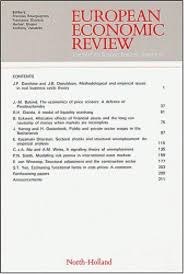
Hodbod, A., Hommes, C., Huber, S. and Salle, I. (2021). The COVID-19 consumption game-changer: Evidence from a large-scale multi-country survey European Economic Review, 140:.
-
Affiliated authors
-
Publication year2021
-
JournalEuropean Economic Review
Prospective economic developments depend on the behavior of consumer spending. A key question is whether private expenditures recover once social distancing restrictions are lifted or whether the COVID-19 crisis has a sustained impact on consumer confidence, preferences, and, hence, spending. The elongated and profound experience of the COVID-19 crisis may durably affect consumer preferences. We conducted a representative consumer survey in five European countries in summer 2020, after the release of the first wave{\textquoteright}s lockdown restrictions, and document the underlying reasons for households{\textquoteright} reduction in consumption in five key sectors: tourism, hospitality, services, retail, and public transports. We identify a large confidence shock in the Southern European countries and a shift in consumer preferences in the Northern European countries, particularly among high-income earners. We conclude that the COVID-19 experience has altered consumer behavior and that long-term sectoral consumption shifts may occur.